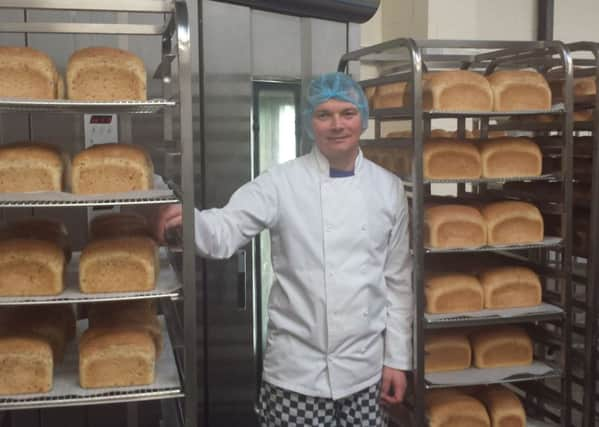500,000 with gluten intolerance undiagnosed


It was previously estimated that between 10 and 15 per cent of people with coeliac disease had received a diagnosis of the condition, which if left unidentified can cause serious health problems.
New research has shown that 24 per cent of sufferers have now been identified. However, campaigners said this still meant three-quarters of people with coeliac disease have not yet been diagnosed.
Advertisement
Hide AdAdvertisement
Hide AdThey called for urgent action to improve diagnosis rates and also extra help so sufferers could maintain gluten-free diets.
Coeliac disease is an autoimmune disease caused by intolerance to gluten - a protein found in wheat, barley and rye.
In those with the condition, eating products containing gluten causes the body’s immune system to react to the food and make the body attack itself.
The new research, funded by charity Coeliac UK, examined figures from the Clinical Practice Research Datalink between 1990 and 2011, estimating that the rate of people being diagnosed had increased four-fold in the last two decades.
In 1990, there were 5.2 people diagnosed with coeliac disease per 100,000 patients. But by 2011 this had increased to 19.1 per 100,000.
The researchers, led by Joe West at Nottingham University, said this meant that around 24 per cent of coeliac disease sufferers had now received a diagnosis.
In terms of total numbers, it means that around 110,000 cases have now been diagnosed.
But Coeliac UK said this still meant there were 500,000 people whose condition had not been diagnosed across the UK.
Advertisement
Hide AdAdvertisement
Hide AdLeft untreated coeliac disease can cause infertility, osteoporosis and bowel cancer.
Overall around one in 100 people in the UK are now thought to have coeliac disease, with the prevalence rising to one in 10 if there are close family members with the condition.
The only treatment for coeliac disease is a strict, life-long gluten-free diet, which often involves coeliac sufferers having to hunt around for products which are safe for them to eat.
Symptoms of coeliac disease range from mild to severe and can vary between individuals. Symptoms include ongoing gut problems such as bloating, abdominal pain, nausea, constipation, diarrhoea and wind, and other common problems such as extreme tiredness, anaemia, headaches and mouth ulcers, weight loss, skin problems, depression and joint or bone pain.
The new research, published by The American Journal of Gastroenterology, comes as Coeliac UK launches its annual awareness campaign which this year is focussing on improving the availability of gluten-free foods in shops across the UK.
Sarah Sleet, chief executive of Coeliac UK, said: “This latest research shows that nearly a quarter of people with coeliac disease have now been diagnosed and gives an up-to-date picture of the diagnosis levels across the UK.
“Of course, increasing numbers with a diagnosis is good news and will inevitably mean that there will be an increased demand for gluten-free products in supermarkets.
“But the three-quarters undiagnosed is around 500,000 people – a shocking statistic that needs urgent action.”
Advertisement
Hide AdAdvertisement
Hide AdThe charity’s “Gluten-free Guarantee” is urging supermarkets to make a commitment to stock eight core items of gluten-free food to make it easier for people to manage their restrictive diet, which remains their only form of treatment.
Ms Sleet added: “Can you imagine going into your local supermarket and there is no bread you can eat, not one loaf, not one slice?
“And when you check out the pasta, cereal or flour again there is nothing available on the shelf which means you have to trawl around two or three stores in order to be able to find your staple foods.
“This is not about your preferred brand but about the major supermarkets ensuring that they have sufficient stock in all their stores, whatever their size for this growing market of people who depend on gluten-free food for their health.”
CASE STUDY: Mhairi McMillan was diagnosed with coeliac disease five years ago – but only after suffering symptoms for 15 years.
She started complaining of headaches when she was five and went on to suffer other problems such as fatigue, hair loss, anxiety, depression and anaemia.
The 25-year-old from Lanark visited the doctor frequently, but failed to get a diagnosis of coeliac disease until she collapsed with anaphylactic shock after returning from honeymoon.
“With the fatigue, because I’d always been like that I thought everybody felt the way I felt but just dealt with it better,” Mrs McMillan said.
Advertisement
Hide AdAdvertisement
Hide Ad“I remember being a teenager and getting really annoyed with myself and thinking I must just be a really lazy person because I can’t manage to do things when everyone else did.”
Within two weeks of starting a gluten-free diet, Mrs McMillan said she felt like a “new person”.
“I never realised how amazing life could be. It was simple things like being able to walk my dog in the morning before work because I had the energy to get up at 7am,” she said.